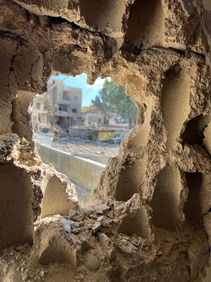
December 2024
During December, despite the circumstances, I was able to return to Lebanon. This was only possible thanks to the generosity of so many people—teachers, parents, school principals, and family members here in Japan.
The daily noise of planes and drones makes you feel like you have no choice but to endure the fear they want to impose. Jets fly low, breaking the sound barrier multiple times a day or night, shaking houses and startling people.
You can see the exhaustion on mothers' faces, tired of this endless situation. Children try to escape boredom, unable to attend school for months. Many schools have shattered windows and damaged walls.
They’re talking about reopening schools in January. Many families are hosting relatives or acquaintances from the south, whose homes have been destroyed during the bombings. My neighbor was housing seven families—some slept on mattresses in the parking. Beaches, sidewalks, and public spaces are full of tents.
People say the war will end soon, and a ceasefire has been agreed upon. Yet, drones and fighter jets continue to roam the skies over the land of cedars.
During my trip, I visited towns flattened by bombings. I was invited into homes, where people kindly offered me coffee or tea. Their resilience is incredible. They keep living and planning for the future.
“Why waste time feeling sorry for ourselves?” an elderly woman told me with a smile. I spent the day helping her clean the dust and debris from her home.
The next day, I visited an orphanage, where most children come from refugee camps. We spent the afternoon playing games, organizing activities, and teaching English. Lebanon offers breathtaking sunsets, each one different from the last. After each day, I felt the need to sit down, watch the sunset, and reflect.
With the local team, we organized a distribution in Akkar, a poor region in the north, located in the mountains. We left early for the long drive to the Syrian border. Most people there work in agriculture.
We arrived around 11 a.m., where hundreds of families from several camps had gathered in one place, waiting for us to start the distribution. Hundreds of blue and white bags lay on the ground, each containing winter clothes.
Winters in this mountainous region are very harsh.
We began by giving out handmade stuffed toys to the children. Their smiles warmed my heart. I noticed many children wearing sandals, and some were barefoot.
We distributed the clothes, visited several families, and listened to their struggles. Then I joined the children, playing and dancing with them. Seeing their eyes light up was magical. Their joy gave me so much energy.
I met Ahmed, a 14-year-old boy with communication difficulties. He fled a camp in the south in November and now finds himself in the north. He told me he wants to return to the south to reunite with his friends because he’s struggled to make new ones in this camp. Ahmed also dreams of becoming a football player and playing in Madrid.
We exchanged a few passes with a ball. Ahmed is my new friend. I want to go back to see him and bring him proper soccer shoes, as he was playing in sandals.
May 2024
A Journey to the Bekaa Valley: Witnessing the Struggles and Resilience of Syrian Refugees
In May 2024, thanks to donations from several English schools and other companies, I had the opportunity to visit Syrian refugees in the Bekaa Valley in Lebanon. The conditions in which these people live left a profound impact on me.
One of the most striking aspects of my visit was the mothers asking me to meet their sick or injured children who desperately needed medical care. The severe lack of food and the overall living conditions were heartbreaking. In several camps I visited, there were makeshift shelters set up to provide children with a few hours of education each day, teaching them to read and write. Tragically, these installations were destroyed by the government on the grounds that they were not legally registered. In one camp, the army even set these shelters on fire.
Most of the children I met were wandering amidst the debris and the stifling heat. These children endure the harsh transition from a freezing winter to the suffocating summer heat of the valley. Many tents were flooded after the snow melted, forcing the majority of the residents to sleep on moldy mattresses. Some children wore boots despite the heat, others wore broken or ill-fitting sandals, and many walked barefoot.
Many of these children begin working as young as eight years old, earning just two dollars a day. The children I met were harvesting potatoes. Despite their circumstances, they greeted me with smiles, made heart shapes with their hands, and welcomed me warmly. No one asked me for anything. I stood there, in the midst of this world, unable to remain indifferent.
With the help of a local organization called "Generous Hand Organization," we organized distributions of mattresses, clothing, and food. We also set up a classroom and purchased all the necessary materials for the children to study. Additionally, I had the chance to visit three orphanages, where most of the children came from refugee camps. There, I was able to teach and bring some smiles to these children.
Though it may seem like a small contribution, this experience was a chance for me to understand the immense needs in these camps. The challenges are vast, but every effort counts.

























